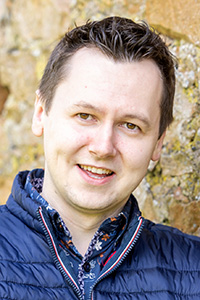
Neurodiverse attendees may benefit from quiet spaces where they can take a break from the lights and sounds at a conference.
When neurotypical people think of situations that could be stressful for neurodivergent people, loud concerts or energetic sports games may come to mind. But what many neurotypical people fail to recognize is that “a conference room that might seem relatively calm to everybody else might feel incredibly overwhelming for an autistic person,” said Adam Harris, CEO of AsIAm, an Ireland-based organization Harris founded to amplify autistic voices because of his own experience growing up with autism.

Adam Harris
Harris spoke at Convening EMEA 2023 in Copenhagen, where he shared the ways in which the typical conference setting challenges neurodivergent attendees.
“Aspects of the sensory environment that other people are unaware of: The fluorescent lighting in a room [or] the sound of the projector may be experienced more intensely by an autistic person,” Harris said. Conferences also represent a huge break in routine, which is something that can be disruptive for people with autism.
“Autistic people going somewhere new, trying something new, or changing routine can induce a lot of anxiety,” Harris said. “There’s that sense of the unknown. So, a lot of times, before [autistic] people are even in the conference environment, there’s a huge amount of stress that comes with … attending the event.” He added that while many events strive to be accessible, those conversations often stop at physical access and overlook the “invisible barriers” neurodivergent people experience. “I have been at national and international disability classes in which autism is simply not discussed,” he said.
Becoming an autism-friendly or autism-accredited destination or venue is not as challenging — or expensive — as it sounds, Harris said, but yields significant results for autistic conference attendees.
“These measures are often extremely cheap, if not free, and not only make a more accessible environment for somebody who is autistic,” he said, “but they can make for more effective operating procedures overall.”
RELATED: More CVBs Earning Autism Travel Accreditation
Harris, whose AsIAm organization will be hosting the 14th Autism Europe Congress in Dublin in 2025, said that creating an inclusive event starts with asking attendees in advance what accessibility requirements they have.
“There’s a tiered approach to this,” he said. “There are things we can put in place universally. But sometimes there are very targeted or specific measures that we might need to be aware of for an individual.”
The next step to creating an inclusive event, he said, is implementing a priority registration system to help autistic attendees who struggle with crowds or the uncertainty of waiting to be helped. “This might mean being able to register earlier than other people or might mean being able to register in a quieter environment before the person even sets foot in the conference center,” he said.
And finally, Harris said, eliminating the unknown as much as possible is critical to accommodating attendees with autism. AsIAm events do this by creating a step-by-step “What to Expect” guide using pictures. “It also advises the person of steps they can take if they’re feeling overwhelmed during the day,” Harris said. Taking these measures can make it “quite pleasant, I think, for any of us going somewhere newer to a big event for the first time.”
Casey Gale is managing editor at Convene.
